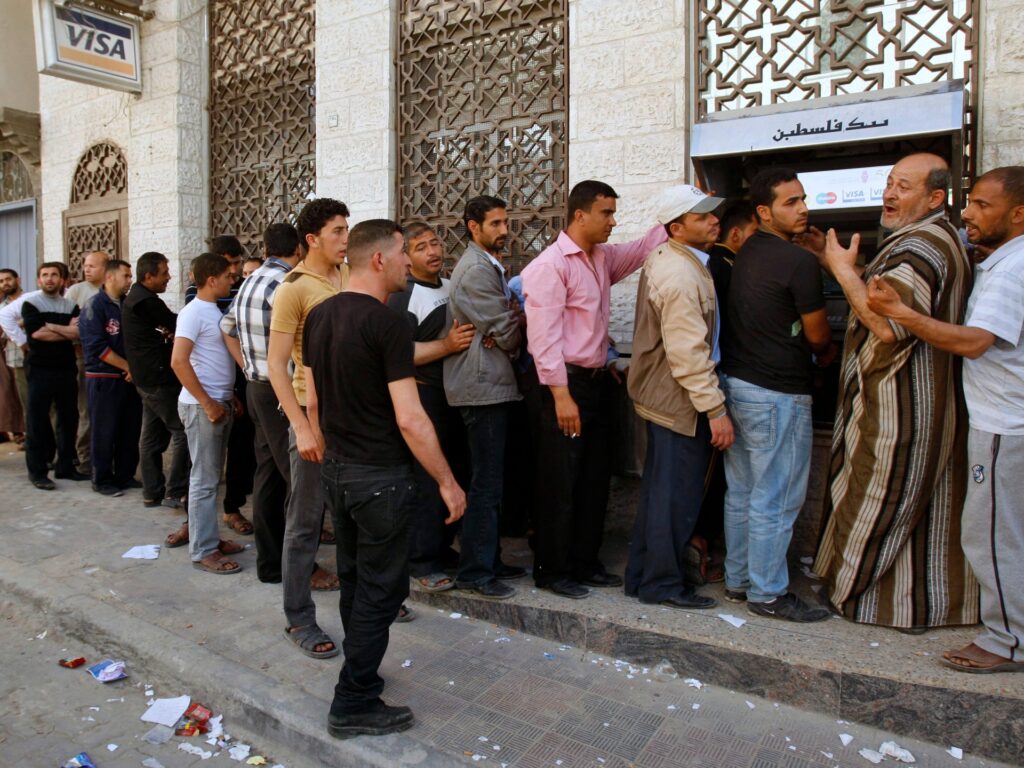The banking sector was not an exception to the sectors of the economy that are suffering as a result of the continuous Israeli bombing of the Gaza Strip for more than two months, after the “Al-Aqsa Flood” operation launched by the Palestinian resistance led by the Izz al-Din al-Qassam Brigades against the occupation on the seventh of last October.
The British newspaper “Financial Times” shed light on a complex operation that took place during the truce, in coordination with the United Nations, and with the approval of the occupation, through a convoy of vehicles to recover banknotes worth 180 million shekels ($48.69 million).
The money, weighing nearly a ton, was in two Bank of Palestine branches in some of the most devastated areas of the besieged Gaza Strip, with only one building intact.
The operation came after Bank of Palestine officials saw the truce as an opportunity to recover 200 shekel banknotes stuck in the north, to help avoid the collapse of the Strip’s economy while worrying about a growing cash shortage in the south, after the majority of the 2.3 million population was displaced.
The rescue operation, which was called “Conops Gaza,” according to the British newspaper, required detailed planning in which the United Nations, Palestinian security personnel, and the occupation’s positions participated.
The roughly 900,000 banknotes were enough to fill a small shipping container, and a person involved in the operation said the convoy was not ordinary but necessary.
Banknotes are now available for circulation in southern Gaza, where strenuous efforts are made every day to keep cash flowing in the face of intense Israeli bombing.
Continuous bombing
With the continuous bombing of the Strip for more than two months, employees drove private cars to closed branches and fed ATMs with cash, albeit without frequent interruptions.
The newspaper quoted an official at the Bank of Palestine as saying that he did this through ATMs and branches located in relatively safe areas, and that only 6 cash machines belonging to the bank were operating in southern and central Gaza.
Employees sometimes resorted to secretly transferring cash between branches and exchange points, a person familiar with the operations said, as basic security vehicles that banks typically use to transport banknotes are no longer an option in the south of the Strip.
The measures taken by Palestinian banks represent an attempt to alleviate the severe crisis in Gaza’s cash-dependent economy, as the besieged population faces rising prices, severe food shortages, and the constant threat of bombing.

Total collapse
With UN Secretary-General António Guterres warning that public order in Gaza may soon “completely collapse”, keeping ATMs running will become more difficult.
Even before the Israeli war on the Strip, 81% of its population was poor and dependent on international aid, according to United Nations figures.
Those who receive support from outside Gaza, or whose money is paid into bank accounts, such as civil servants and families who receive aid in the form of salaries, rely on ATM networks.
Payments from the Palestinian Authority, whose funding Israel has imposed pressure on, have also been irregular, as it has been forced to reduce wage payments to public sector employees, having paid only two weeks’ salary since the beginning of the war.
Some bank branches in southern Gaza reopened during the truce to provide emergency services, and the Palestine Monetary Authority, which regulates lenders, issued instructions to provide loans to workers whose salaries were delayed or reduced. It also asked banks to provide emergency funds to companies and reschedule debts to borrowers.
Banks also took measures such as extending the validity of bank cards that were about to expire, but access to cash, via ATMs, ultimately depends on electricity and the Internet, which the Gaza Strip loses completely or partially.

